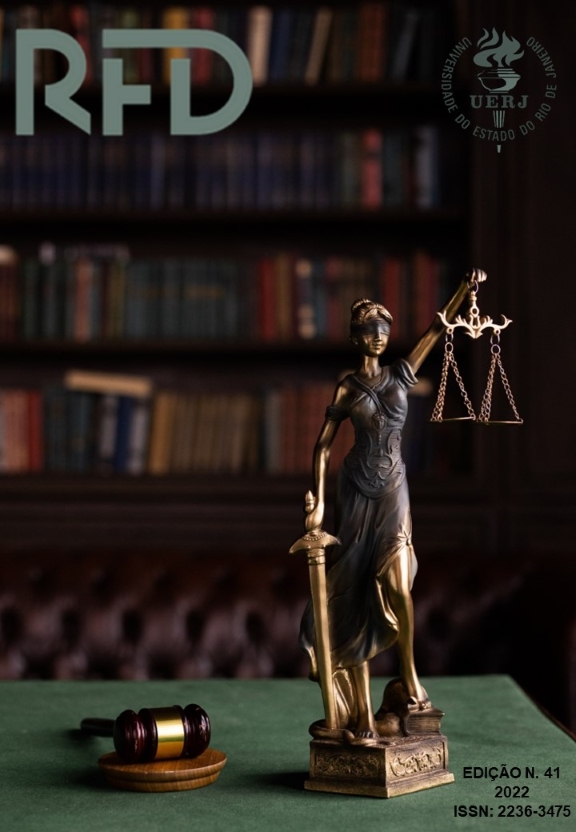STAKEHOLDERS E GOVERNANÇA CORPORATIVA NAS EMPRESAS ESTATAIS / STAKEHOLDERS AND CORPORATE GOVERNANCE IN STATE COMPANIES
DOI:
https://doi.org/10.12957/rfd.2022.43719Palavras-chave:
Empresas estatais, Governança corporativa, Stakeholders, Participação da sociedade, Conselho de administração.Resumo
Resumo: A governança corporativa compreende um conjunto de técnicas administrativas transparentes e eficazes que prima pelo profissionalismo e consideração das partes interessadas na elaboração de políticas e no processo decisório das companhias. Extremamente difundida no contexto empresarial brasileiro atual, a governança confere especial papel ao conselho de administração, enquanto núcleo sustentável de todo o processo administrativo. Um dos papéis do referido conselho é justamente atribuir voz a todas as partes interessadas, os chamados stakeholders, o que inclui não apenas os administradores, mas também funcionários, credores, fornecedores e terceiros. As empresas estatais, compreendidas as empresas públicas, sociedades de economia mista, subsidiárias, coligadas ou em que o ente público detenha mais da metade do capital votante, também podem aderir ao modelo de governança corporativa, organizando seu fluxograma para a ampla participação dos stakeholders. Ocorre que em tais empresas, sejam prestadoras de serviços públicos ou exercentes de atividade econômica em sentido estrito, existe um interesse público inato que conclama a inserção da sociedade enquanto parte interessada. Trata-se de uma análise do papel do controlador estatal na governança das empresas estatais e outros stakeholders, como trabalhadores, consumidores e fornecedores não serão objeto de análise, mas sim a PEC 45/2015 e a Lei das Estatais. O objetivo deste trabalho é apresentar propostas para promover a participação da sociedade na administração das empresas estatais. A pesquisa é eminentemente bibliográfica, legal e documental e o método utilizado é indutivo.
Palavras-chave: Empresas estatais; Governança corporativa; Stakeholders; Participação da sociedade; Conselho de administração.
Abstract: Corporate governance comprises a set of transparent and effective administrative techniques that excel by the professionalism and consideration of stakeholders in policy making and in the decision-making process of companies. Extremely widespread in today's Brazilian business context, governance confers a special role to the board of directors, as a sustainable core of the entire administrative process. One of the roles of this council is precisely to give voice to all stakeholders, the so-called stakeholders, which includes not only managers, but also employees, creditors, suppliers and third parties. State-owned enterprises, including public companies, mixed-capital companies, subsidiaries, affiliated companies or public bodies holding more than half of the voting capital, can also adhere to the corporate governance model, organizing their flowchart for broad stakeholder participation. It occurs that in such companies, whether they are public service providers or economists in the strict sense, there is an innate public interest that calls for the insertion of society as an interested party. It is an analysis of the role of the state controller in the governance of state-owned companies and other stakeholders, such as workers, consumers and suppliers will not be the object of analysis, but PEC 45/2015 and the State-owned Law. The purpose of this paper is to present proposals to promote the participation of society in the management of state-owned enterprises. The research is eminently bibliographical, legal and documentary and the method used is inductive.
Keywords: State-owned companies; Corporate governance; Stakeholders; Participation of the company; Administrative Council.
Downloads
Publicado
Como Citar
Edição
Seção
Licença
Direitos Autorais
oArtigos publicados na Revista da Faculdade de Direito da UERJ (RFD/UERJ)
Os Direitos autorais dos artigos publicados pertencem à Revista da Faculdade de Direito da UERJ (RFD/UERJ). É permitida a reprodução total ou parcial dos artigos desde que citada a fonte.
oReprodução parcial de outras publicações
Artigos submetidos que contiverem partes de texto extraídas de outras publicações deverão obedecer aos limites especificados para garantir originalidade do trabalho submetido. Plágio em todas as suas formas constitui comportamento antiético e é inaceitável.
Recomenda-se evitar a reprodução de tabelas e ilustrações, extraídas de outras publicações. O artigo que contiver reprodução de uma ou mais tabelas e/ou ilustrações de outras publicações só será encaminhado para análise se vier acompanhado de permissão escrita do detentor do direito autoral do trabalho original para a reprodução especificada na Revista da Faculdade de Direito da UERJ (RFD/UERJ). A permissão deve ser endereçada ao autor do trabalho submetido. Em nenhuma circunstância a Revista da Faculdade de Direito da UERJ (RFD/UERJ) e os autores dos trabalhos publicados nesta revista repassarão direitos assim obtidos.
·Os trabalhos não aceitos para a publicação serão devolvidos aos autores, se solicitado.
A Revista da Faculdade de Direito está licenciada com uma Licença Creative Commons Atribuição 4.0 Internacional.
Este trabalho está licenciado sob uma Licença Creative Commons 4.0, Atribuição-Sem Derivações.
Esta licença permite copiar e redistribuir o material em qualquer suporte ou format para qualquer fim, mesmo que comercial, desde de que citada a autoria original.











